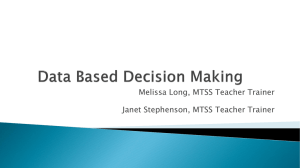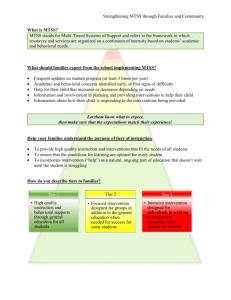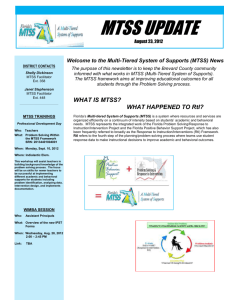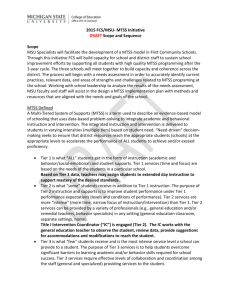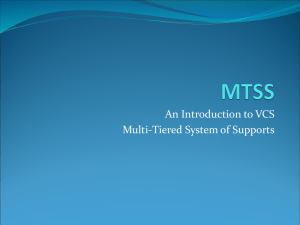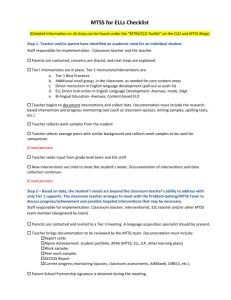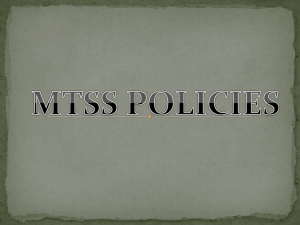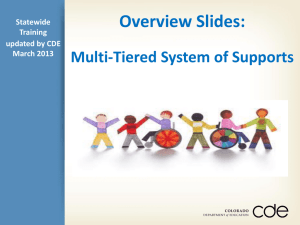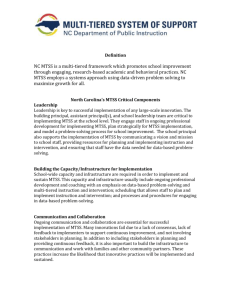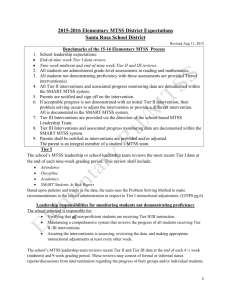MTSS Overview for LEP Coordinators.2014.10.3
advertisement
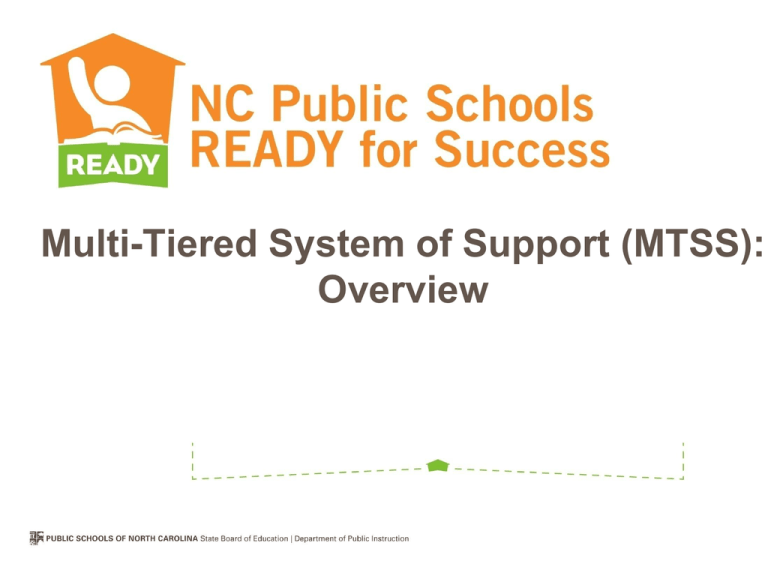
Multi-Tiered System of Support (MTSS): Overview Objectives Become familiar with: Common language of MTSS Tier I, II, III 2 Responsiveness to Instruction PBIS RtI RtI/PBIS/MTSS Positive Behavior Intervention and Support Multi-Tiered System of Support (MTSS) NC MTSS Definition NC MTSS is a multi-tiered framework which promotes school improvement through engaging, research-based academic and behavioral practices. NC MTSS employs a systems approach using datadriven problem-solving to maximize growth for all. NCDPI MTSS Vision Every NC Pre K-12 public education system implements and sustains all components of a MultiTiered System of Support to ensure college and career readiness for all students. NCDPI MTSS Mission NCDPI will prepare and support LEAs to implement a Multi-Tiered System of Support for total school improvement by providing professional development, coaching and technical assistance, research and evaluation, and communication and visibility that results in college and career readiness for all students. NCDPI believes that MTSS is the most effective and efficient approach to improving school outcomes and student performance thereby ensuring equitable access to a sound basic education. Critical Components of MTSS 1. Leadership and Shared Responsibility 2. Problem-Solving/Data Driven Decision Making 3. Assessment 4. Curriculum and Instruction 5. Sustainability and Integration 6. Family and Community Collaboration 8 Shift in Focus Process for some students Framework for total school improvement Tier I: Core Who: All students are in Tier I (Core) What: Evidence-based programs and practices demonstrated to produce good academic and behavior outcomes for the majority of students Effectiveness: If at least 80% of all students are meeting academic and behavior benchmarks in Core alone. What about subgroups? Slide adapted from G. Batsche 10 Tier I – Core • Includes all students • Focus on all students across a grade and response to core • Monitor response (of all students) to instructional changes Analyzing Foundational Core Analyzing Foundational Core • Are at least 80% of your students proficient in each subgroup with foundational core alone? • What is working? Why? How do you know? • What’s not working? Why? How do you know? • Do teachers have needed skills & content knowledge? Tier II: Supplemental Instruction Who: Students needing supplemental support in addition to Core instruction (approx. 20% of students) What: Evidence-based programs and practices demonstrated to improve academic and behavior performance in Core Effectiveness: If at least 70-80% of students improve academic and behavior performance (toward Core standards) Slide adapted from G. Batsche Tier II – Supplemental + Core • Instruction is connected to core content • Supplemental instruction does not supplant core • Analysis of effectiveness of Tier II instruction for all students (towards Core Standards) Tier III: Intensive Instruction Who: Students needing Intensive support in addition to Supplemental and Core instruction (approx. 5% of students) What: Evidence-based programs and practices demonstrated to improve academic and behavior performance Effectiveness: Academic and behavior progress toward performance in Core Slide adapted from G. Batsche 16 Tier III – Intensive + Supplemental + Core • Instruction is most intensive in the building • Increase intensity and frequency (time, duration, or digging deeper in specific skill) • Analysis of effectiveness of Tier III instruction for all students (towards Core Standards) Tier II – Supplemental + Foundational Core • Instruction is connected to core content • Supplemental instruction does not supplant core • Documentation is on same form for individual student • Analysis of effectiveness of Tier II instruction for all students (towards Core Standards) Layering of Support Intensive Support Supplemental Support Differentiated Core 19 State Support • Professional Development • Coaching • Evaluation Tools • Communication Statewide Support Amy Jablonski, amy.jablonski@dpi.nc.gov MTSS Statewide Consultant Angie Cloninger Beth Kolb angie.cloninger@dpi.nc.gov MTSS Consultant, Region 1 & 2 melissa.kolb@dpi.nc.gov MTSS Consultant, Region 4 & 6 Amy Miller Lynn Bailey amy.miller@dpi.nc.gov MTSS Consultant, Region 3 & 5 lynn.bailey@dpi.nc.gov MTSS Consultant, Region 7 & 8
